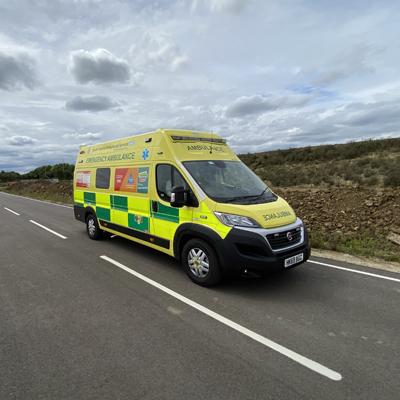
Credit: Cranfield University
Cranfield University is working with Q-Flo, Cambridge University and NHS England to record experimental airflow data from a modern NHS ambulance under different driving conditions.
Collection of the data, which is being funded by the Royal Academy of Engineering, will explore the effective installation of filtration units which are able to remove virus molecules, including COVID-19 aerosols.
Professor Helen Atkinson CBE, FREng, Pro-Vice-Chancellor – Aerospace, Transport and Manufacturing at Cranfield University, who is overseeing the project, said: “We’re very pleased to be able to support the Royal Academy of Engineering’s Engineering X Pandemic Preparedness scheme along with our project partners Q-Flo, Cambridge University and NHS England.
“There are currently nearly 30,000 paramedics in the UK and thousands of ambulances nationwide. Airflow patterns inside ambulances are complex and not well documented – mapping these flows will enable the optimised installation of filtration systems and reduce the potential exposure of NHS ambulance crews to COVID-19 aerosols in their vehicles.”
Phil Pimlott MBE, Assistant Director Operations South Central Ambulance NHS Foundation Trust (SCAS) and Chair of the UK National Strategic Ambulance Fleet Group (NSAFG), said: “SCAS, on behalf of the NSAFG, is very pleased and excited to be involved with this project and is fully committed to working with the group in an area that has been a challenge for ambulance services and the NHS for numerous years.
“The success of this project will be extremely positive for the patients we carry and care for as well as assisting our ambulance crews across the UK and potentially the world in delivering the highest care they can give to patients.”
The project will provide flow maps from the ambulance interior over a range of driving conditions up to 70 mph. COVID-19 aerosol sizes, that can be inhaled, are generally less than 10 microns in diameter and particles of this size tend to follow flow patterns without settling onto surfaces.
Dr Adam Boies, Reader in the Department of Engineering at the University of Cambridge and partnership director in the Aerosol Centre for Doctoral Training, said: “Effective filtration strategies for PM10 particles are increasingly seen to return environments to safe levels of operation following viral release whereby suspended particles that remain after droplet drying may remain indefinitely without dilution or active removal.”
The flow data will facilitate the integration of an active virus filter (AVF) system – TorStranTM – developed by Q-Flo Ltd, which takes in contaminated air and captures individual virus molecules, including those contained in airborne droplets, then destroys the virus molecules and returns clean air to the environment.
Martin Pick, Chief Operating Officer of Q-Flo, said: “The collaboration with Cranfield has been positive and perfectly timed. The TorStran™ Activer Virus Filter will help to keep people safe, reducing the risk of infection, but it is critically important that we understand where to position the unit to ensure maximum effectiveness.”
Knowledge of the flow field is key to allowing Q-Flo to effectively integrate their filtration system into NHS ambulances. The current filtration design is at an advanced phase, meaning a significant roll out of the product could occur in the next 12 months.
Work to collect the data is already underway and a flexible mounting system has been fitted inside an ambulance interior for the light source and imaging system. Calibration and testing of the flow visualisation system in a stationary and moving ambulance has already begun, enabling the acquisition of image datasets from selected regions of the vehicle.
Cranfield’s Multi-User Environment for Autonomous Vehicle Innovation (MUEAVI) – a ‘smart’ road test environment, which is a first of its kind in the UK, built alongside a research airport within the controlled setting of a university campus – is being used in the research for instrumentation testing and data capture at low speeds with an emergency 999 ambulance provided by SCAS.
Data from the project will be openly published, allowing other vehicle designers to improve their ventilation systems.
The project is also expected to lead to other larger projects, such as modelling of airflows in vehicles using computational fluid dynamics, leading to greater refinement of vehicle filtration systems.
The approach will also aid cabin design and provide leverage for further work to measure and model flows in other significant transport systems, such as buses, aircraft and trains, where COVID-19 infection still presents known risk. Any future pandemic will also benefit from the knowledge gained in this research.
###
Media Contact
Miranda Stockford
[email protected]
Original Source
https:/




